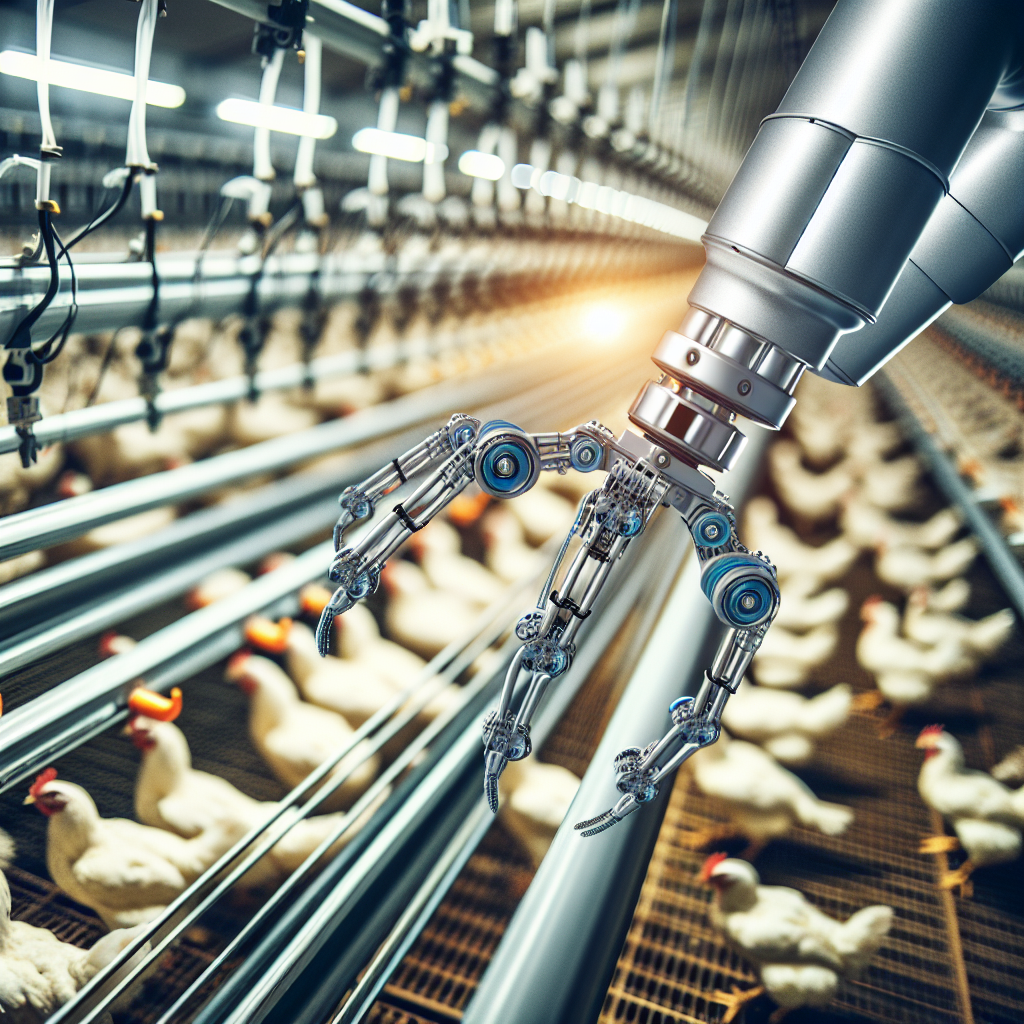Have you ever wondered how technology can revolutionize the breeding process and track lineage? In this article, we will explore the potential impact of technology on the breeding industry and how it can bring about advancements in the field. From DNA testing to digital record-keeping, technological innovations have the potential to not only enhance the efficiency and effectiveness of breeding, but also provide valuable insights into the genetic lineage of animals. Join us as we delve into the exciting world where technology meets breeding, and discover the possibilities that lie ahead.
Advancements in Biotechnology
Biotechnology has revolutionized the field of breeding by offering efficient and precise methods to enhance the breeding process and track lineage. Among the various techniques within biotechnology, genetic engineering and CRISPR technology have emerged as groundbreaking tools that allow breeders to introduce specific genetic traits into animals. These advancements have opened up new possibilities for improving the productivity, health, and quality of livestock and companion animals.
Genetic Engineering
Genetic engineering involves manipulating an organism’s genetic material to incorporate desired traits or remove undesirable ones. This technique has proved valuable in breeding by allowing the transfer of specific genes between organisms, resulting in improved characteristics in the offspring. For example, through genetic engineering, scientists have successfully created animals with enhanced disease resistance, improved growth rates, and increased milk production. Such advancements have significantly contributed to the overall welfare and profitability of the breeding industry.
CRISPR Technology
CRISPR (Clustered Regularly Interspaced Short Palindromic Repeats) is a revolutionary gene-editing tool that has gained immense popularity in recent years. This technology enables precise and efficient editing of an organism’s DNA, offering incredible potential in breeding. By utilizing CRISPR, breeders can modify specific genes to enhance desirable traits and eliminate detrimental ones. The possibilities are vast, ranging from developing disease-resistant animals to producing offspring with superior genetic characteristics. CRISPR technology empowers breeders to achieve targeted results with greater accuracy and efficiency.
Artificial Insemination
Artificial insemination (AI) is a technique widely used in animal breeding to increase the efficiency of reproduction and genetic improvement. By bypassing the need for natural mating, AI offers numerous benefits to breeders.
Benefits of AI in Breeding
AI enables breeders to access superior genetic material from animals located remotely or even deceased. This allows for a broader gene pool and enhances the chances of producing offspring with desired traits. Moreover, AI eliminates the risks associated with natural mating, such as injury to animals or the transmission of diseases. It also enables breeders to control the timing of insemination, ensuring optimal conditions for successful conception. Overall, AI significantly enhances breeding efficiency and facilitates the selection of superior genetic traits.
Technological Tools for AI
AI is supported by various technological tools that streamline the insemination process. One crucial tool is the semen straw, which contains preserved sperm cells and is used for artificial insemination. Another essential component is the AI gun, a device that allows inseminators to deposit the semen directly into the animal’s reproductive tract. Additionally, advancements in cryopreservation techniques have made it possible to store and transport semen over long distances while maintaining its viability. These tools, combined with proper training and expertise, make AI an accessible and effective breeding method.
AI Tracking Systems
Tracking the success and efficiency of artificial insemination is crucial for breeders to monitor and improve their breeding programs. AI tracking systems utilize technologies such as radio frequency identification (RFID) and ultrasound to accurately record and analyze breeding data. These systems allow breeders to track the timing of inseminations, monitor conception rates, and assess the overall reproductive performance of animals. By leveraging AI tracking systems, breeders can make informed decisions to optimize breeding strategies and achieve their desired genetic goals.
Embryo Transfer
Embryo transfer is a technique that involves removing embryos from a genetically valuable female animal and transferring them to recipient animals for further development. This method offers numerous advantages in animal breeding, particularly in scenarios where the genetic potential of an animal is highly desirable.
In Vitro Fertilization
In vitro fertilization (IVF) plays a crucial role in the embryo transfer process by facilitating the collection and fertilization of eggs outside the animal’s body. IVF allows breeders to extract eggs from genetically valuable females and combine them with carefully selected sperm cells in a laboratory setting. This controlled environment ensures higher fertilization rates and increases the chances of producing high-quality embryos. IVF has revolutionized the breeding industry by unlocking breeding opportunities that were previously limited by the natural reproductive capacity of animals.
Cryopreservation
Cryopreservation involves freezing and storing embryos, sperm, or eggs for future use. This technique has transformed the breeding process by enabling breeders to preserve and transport genetic material over long distances without loss of viability. The ability to store embryos allows breeders to synchronize the transfer with the recipient animal’s reproductive cycle, ensuring optimal conditions for successful implantation. Cryopreservation also serves as a safeguard against unforeseen circumstances, such as the loss of genetically valuable animals, by preserving their genetics for future breeding purposes.
Embryo Storage Solutions
Embryo storage solutions offer breeders a reliable and secure method to store and manage frozen embryos. These solutions utilize advanced technologies to maintain embryos at ultra-low temperatures, ensuring their long-term viability. Additionally, embryo storage facilities often provide comprehensive record-keeping systems that track the origin, genetic potential, and storage history of each embryo. Proper storage solutions and meticulous documentation play a vital role in maintaining the integrity and traceability of breeding lines.
Marker-assisted Selection
Marker-assisted selection (MAS) is a powerful technique that enables breeders to identify and select animals with desirable genetic traits more efficiently. By utilizing genetic markers that are linked to specific traits of interest, breeders can streamline the breeding process and make more accurate selection decisions.
DNA Profiling
DNA profiling involves analyzing an animal’s DNA to determine its specific genetic makeup. Through DNA profiling, breeders can identify genetic markers linked to desirable traits such as disease resistance, growth rates, or milk production. By conducting DNA profiling on a large scale, breeders can build up a comprehensive database of genetic information, allowing them to make informed breeding decisions. Additionally, DNA profiling aids in verifying the lineage and parentage of animals, ensuring the accuracy of pedigrees.
Genomic Selection
Genomic selection is a technique that utilizes genomic information to estimate an animal’s breeding value. By examining an animal’s entire set of genes, breeders can predict its performance for various traits, even before those traits become physically observable. Genomic selection significantly accelerates the breeding process by providing early information on an animal’s potential genetic merit. This allows breeders to prioritize animals with high breeding values, increasing the efficiency and success of their breeding programs.
Data Management and Analysis
Managing and analyzing breeding data is crucial for breeders to make informed decisions and drive continuous improvement in their breeding programs. The advancement of technology has brought forth various tools and systems that facilitate efficient data management and analysis.
Database Systems
Database systems specifically designed for animal breeding provide breeders with a consolidated platform to store, organize, and retrieve breeding data. These systems offer functionalities such as recording breeding events, managing pedigree information, and storing genetic data. With comprehensive database systems, breeders can access critical information in real-time, track lineage, and analyze breeding trends, enabling them to make data-driven decisions.
Big Data Analytics
The vast amount of breeding data collected can be analyzed using advanced big data analytics techniques. By applying statistical algorithms and machine learning models, breeders can uncover hidden patterns and correlations within the data, gaining valuable insights. Big data analytics enables breeders to identify relationships between specific genetic traits, evaluate the effectiveness of breeding strategies, and predict the breeding potential of animals. This data-driven approach empowers breeders to optimize their selection decisions and achieve their breeding goals more efficiently.
Pedigree Tracking Apps
Pedigree tracking apps offer breeders a convenient and accessible way to record and track lineage information. These mobile applications allow breeders to digitally document breeding events, register offspring, and manage pedigrees on the go.
Mobile Apps for Record Keeping
Pedigree tracking apps simplify record-keeping by replacing traditional paper-based methods with digital platforms. Breeders can easily capture and store information about mating, births, and genetic traits using their smartphones or tablets. These apps often provide customizable fields to accommodate various breeding programs and allow breeders to attach photos or scanned documents for additional documentation. With mobile apps for record keeping, breeders can ensure accurate and up-to-date pedigrees, saving time and reducing the risk of errors.
Online Pedigree Databases
Online pedigree databases serve as centralized platforms for breeders to share and access pedigree information. These databases enable breeders to search for animals with specific lineage or genetic traits, facilitating the discovery of potential breeding partners. By contributing to online pedigree databases, breeders can participate in a larger breeding community, share knowledge, and collaborate with other breeders. This interconnectedness enhances the overall breeding efforts and promotes the exchange of valuable genetic information.
Genomic Testing and Gene Mapping
Advancements in genomic testing and gene mapping have revolutionized breeding by providing valuable insights into an animal’s genetic composition. By identifying genes of interest and understanding their impact, breeders can make better-informed breeding decisions and drive genetic improvement.
Identifying Genes of Interest
Genomic testing enables breeders to identify specific genes that contribute to desired traits or health conditions in animals. For instance, by analyzing an animal’s DNA, breeders can identify genes associated with meat tenderness or resistance to certain diseases. Identifying genes of interest allows breeders to selectively breed animals carrying these favorable genetic variants, leading to a higher likelihood of producing offspring with desired traits.
Improved Breeding Decision Making
By incorporating genomic testing into the breeding process, breeders can make more accurate and informed decisions. With knowledge about an animal’s genetic potential, breeders can strategically select breeding partners and match animals based on their complementary traits. This targeted approach increases the chances of producing offspring with superior genetic characteristics, ultimately enhancing the breeding program’s success rate. Genomic testing also helps breeders avoid potential genetic defects, ensuring the health and well-being of the animals and maintaining the integrity of the breeding line.
Animal Tracking and Monitoring
The ability to track and monitor animals is crucial in breeding programs to ensure their well-being and identify any health or behavioral issues promptly. Technological advancements have introduced various tracking and monitoring devices that provide breeders with real-time insights into their animals’ movements and health status.
GPS Tracking Devices
GPS tracking devices offer breeders the ability to monitor the location and movement patterns of their animals. These devices utilize global positioning system technology to transmit accurate location data, enabling breeders to track animals in real-time. GPS tracking devices are particularly beneficial for animals in extensive or free-range systems, ensuring their safety and security. Additionally, such devices can aid in managing grazing patterns, optimizing herd distribution, and preventing theft or loss.
Health Monitoring Sensors
Health monitoring sensors, such as wearable devices or implantable sensors, provide breeders with valuable insights into their animals’ well-being. These sensors can measure vital signs, detect changes in behavior, and monitor various health parameters. By continuously monitoring an animal’s health, breeders can identify potential issues at an early stage and take appropriate measures to prevent or treat diseases. Health monitoring sensors improve animal welfare, enhance breeding success, and contribute to the overall sustainability of the breeding industry.
Blockchain Technology in Breeding
Blockchain technology has gained significant attention across various industries, including breeding. This decentralized and transparent technology offers breeders several advantages in terms of data integrity and transparency.
Ensuring Data Integrity
Blockchain technology provides breeders with a secure and tamper-proof method to store and manage breeding data. The decentralized nature of blockchain ensures that once data is recorded, it cannot be altered or modified without the agreement of all participants. This immutability enhances the trustworthiness and reliability of breeding records, preventing fraudulent activities or unauthorized changes. By leveraging blockchain technology, breeders can ensure the integrity of pedigrees, genetic information, and breeding history.
Enhancing Transparency
Transparency is essential in the breeding sector, as it promotes trust and facilitates fair transactions. Blockchain technology enables breeders to create transparent and auditable records of animal lineage, genetic traits, and breeding agreements. The decentralized nature of blockchain ensures that all participants have visibility into the recorded data, eliminating information asymmetry and fostering a more equitable breeding environment. Blockchain technology also facilitates the traceability of breeding lines, allowing consumers to verify the origin and characteristics of animals and their products.
Challenges and Ethical Considerations
While technological advancements have brought significant benefits to the breeding industry, they also pose challenges and raise ethical considerations that breeders must address.
Potential Risks
As with any technological intervention, advancements in biotechnology and breeding techniques come with potential risks. Genetic engineering and gene editing techniques, while promising, require careful consideration to avoid unintended consequences or long-term effects on animal health and welfare. Furthermore, the reliance on technological tools and systems introduces the risk of data breaches or technological vulnerabilities that could compromise breeding records or expose genetic information. Breeders must remain vigilant and implement adequate safeguards to mitigate these risks effectively.
Privacy Concerns
The extensive collection and use of genetic data raise privacy concerns, as it involves the storage and processing of highly sensitive information. Breeders must ensure that they handle genetic data in compliance with relevant privacy regulations and guidelines. Implementing secure data management practices, including encryption and access control measures, is crucial to protect the privacy and confidentiality of genetic information. Additionally, breeders should obtain informed consent from animal owners before collecting or analyzing genetic data, respecting the rights and autonomy of individuals involved in the breeding process.
In conclusion, technology has presented breeders with a wealth of tools and techniques that enhance the breeding process and enable effective lineage tracking. Advancements such as genetic engineering, CRISPR technology, artificial insemination, embryo transfer, marker-assisted selection, data management systems, pedigree tracking apps, genomic testing, animal tracking devices, and blockchain technology have all contributed to improving breeding efficiency, genetic selection accuracy, and the overall welfare of animals. However, breeders must also be mindful of potential risks and ethical considerations as they embrace these technological advancements. By striking a balance between technological progress and responsible breeding practices, breeders can maximize the benefits of technology while upholding their commitment to ethical animal care and sustainable breeding practices.



